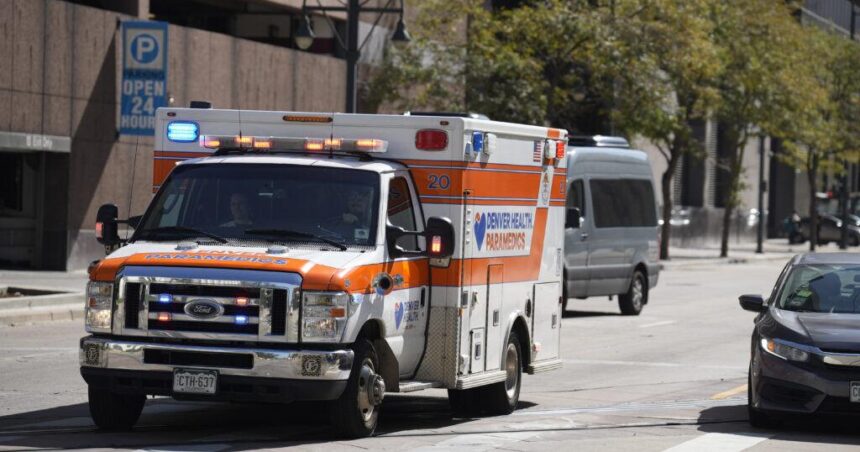Members of the Denver council on Monday sparred over a proposed tax hike that would make the city among the highest taxed in Colorado and over a $5 million contract for homeless shelters using one-time funds.
A pair of councilmembers, Amanda Sawyer and Stacie Gilmore, voiced opposition to homeless contract, with the District 5 official arguing that city has been spending money too fast.
Later in the meeting, the proposed sales tax hike drew opposition from Councilmember Kevin Flynn, who ultimately became the sole vote against referring the measure to Denver voters. Councilmembers agreed voters should have the final say, especially on tax-related matters.
The councilmembers first tackled a proposed $5 million contract for Housing Connector — money meant to provide financial assistance and rental subsidies for homeless people.
Sawyer criticized the overall strategy of Johnston’s administration, saying the city has been dolling out money too fast. The $5 million contract for the mayor’s homeless initiative would make use of American Rescue Plan Act money, of which Denver received $308 million.
“If they had slowed down and done it right the first time, we could have found the dollars to make this a sustainable program,” she said. “You cannot have sustainable programs without sustainable funding.”
Mayor Mike Johnston has vowed to solve homelessness in Denver within his first term as mayor. On his first day in office, the mayor declared homelessness an emergency and vowed to get 1,000 people off the city’s streets before the end of 2023.
This year, he seeks to move to shelters an additional 1,000 people before 2025. The program — and the city’s homelessness crisis — have cost taxpayers hundreds of millions.
Broadly speaking, Denver’s metro area successfully found permanent housing solutions for only 21% of those exiting homeless programs in 2022, well below the 33% rate that was the average that year for the 48 most populated metro regions, according to federal data. And a review by The Denver Gazette of homeless provider contracts, invoices, performance outcomes and federal data showed that metro Denver trails many other major metropolitan regions in tackling homelessness with permanent housing.
The money from ARPA must be spent by the end of next year and obligated by the end of this year, Sawyer noted. The councilmember voted against proposal because it’s tapping one-time funding, even as the city expects to spend roughly $50 million to pay for the mayor’s program in a year.
Gilmore, who joined Sawyer in opposition, accused the mayor’s office of lacking transparency in how much the program has cost. Gilmore estimated she’s asked for a budget presentation at least 10 times since July of last year and has only recently received one.
However, the public has no way to see that presentation, she said, adding that’s something that greatly disturbed her. She described the situation as “undemocratic.”
“I can’t continue to vote affirmatively on this, even if (the city has) really, really good programs because we’re signing checks away and we need to have some accountability,” she said. “Again, these are ARPA dollars. They have a limited time, and we don’t know how we’re going to pay for this, and I have too many important programs (to fund).”
The $5 million contract ultimately sailed through with an 8-2 vote.
Later on in the meeting, Flynn criticized the proposed sales tax increase, saying he worries that the city has begun to “reflexively” turn to sales taxes to fund programs. He called sales tax increases the most “regressive” form of increasing citywide revenue, arguing it would affect lower-income residents especially hard.
The proposal adds 0.34 points to the current sales tax rate of 8.81%, raising it to 9.14% total. The proposed increase is expected to provide up to $70 million to fund Denver Health, a network of healthcare providers throughout the city which includes clinics in schools and other services. With other proposed tax increases also in the pipeline, Denver’s taxpayers could see the rate go up as high as 9.61%.
The tax increase would, if approved, make Denver one of the highest-taxed major cities in the state, surpassing Boulder and Colorado Springs.
Flynn said he also worries that, as a safety net hospital, Denver Health accepts patients from all across the metro Denver Metro area and suggested it be funded by surrounding municipalities.
“My vote tonight is one of protest, but I am not going to campaign against the sales tax increase,” he said. “I just wanted to go on the record as saying that we should have a more comprehensive solution than turning to our sales tax.”
Councilmember Chris Hinds lauded Denver Health for its services, despite having reservations on the mechanism of funding. Hinds remembered when Jolon Clark was in the council and introduced so many sales tax rate increases that Clark found himself nicknamed “The Taxman.” Hinds supported many of those increases but currently worries that the most recent proposed rate increase may be a tad too high versus the previous 0.25-point tax hike.
Still, Hinds voted to refer the measure to Denver voters.
“There are so many people whose lives have been saved because of Denver Health,” he said. “We shouldn’t get into business of checking insurance papers before dispatching the ambulance or performing valuable medical treatment.”
The bill passed 9-1.
The sales tax increase appeared before the full council on Monday for the first time. Bills must be “read” by the council twice before they are voted on and published. In some cases, such as the proposed sales tax hike, the mayor must also sign the bill before voters will get the chance to decide its fate in November.











